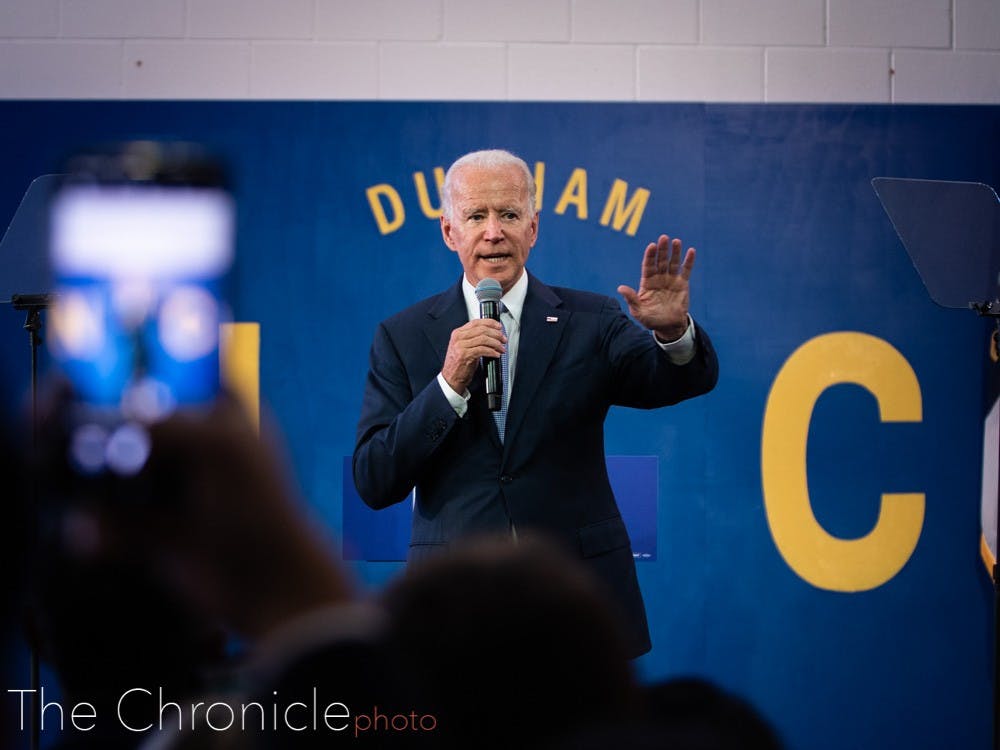Joseph Robinette Biden Jr. was elected the next president of the United States on Saturday.
Biden will enter office with a vision for liberal governance, including plans to implement a coordinated national response to COVID-19, invest in green energy, expand Obamacare, implement criminal justice reform and undo Trump’s immigration policies. During the campaign, Biden offered the promise of a return to normalcy after four years of chaotic governance under President Donald Trump.
His running mate, Senator Kamala Devi Harris (D-Calif.), is the first woman, the first Black person and the first person of Indian descent elected vice president.
"I sought this office to restore the soul of America, to rebuild the backbone of this nation, the middle class and to make America respected around the world again," Biden said Saturday night, in a victory speech in his hometown of Wilmington, Delaware.
The president-elect thanked the American people for turning out in record numbers to make his victory possible, and he emphasized his commitment to rebuilding and healing the nation. He listed his priorities for the next four years, including tackling climate change and racial injustice, but stressed that his first battle will be against a pandemic that has killed more than 230,000 Americans.
Harris took the stage before Biden and thanked the American people for ushering in “a new day in America.” She reflected on the historical importance of her election as the first woman in the office of Vice President, as well as the first Black or South Asian person in the position.
“But while I may be the first woman in this office, I will not be the last. Because every little girl watching tonight sees that this is a country of possibilities,” Harris said.
Biden's victory marked the conclusion of a long election whose results were delayed by waits over ballot counts. News organizations including the Associated Press and CNN projected at around 11:30 a.m. Saturday that Biden had won Pennsylvania, and thus the presidential race.
Trump has not yet conceded the race, despite Biden's projected victory, promising unspecified legal challenges to the results,
On election night, with many votes still to count, the electoral map had not shown a clear winner: Trump was ahead in key swing states like Pennsylvania, North Carolina and Georgia, while Biden had pulled ahead in Arizona and Nevada.
But as the remainder of absentee ballots were counted, crucial states swung to Biden. He won Wisconsin and Michigan, putting him at 253 electoral votes, even as the Trump campaign embarked on legal challenges to seek a recount in Wisconsin and to attempt to halt the count in Michigan. An early call of Arizona—putting Biden at 264 electoral votes—by the AP and Fox was also met by pushback from the Trump campaign, but both decision desks stood by the decision.
As votes were tallied, Biden called for patience and trust in the “messy” process of democracy, while Trump made false claims about attempts to steal the election and falsehoods about voter fraud.
In the early morning Friday, Biden pulled ahead of Trump in Pennsylvania and Georgia. He continued to hold his leads in Arizona and Nevada.
CNN data as of Nov. 8. Graphic by Cameron Oglesby.
"The numbers tell us a clear and convincing story: We're going to win this race," Biden said in a Friday night speech.
Students involved in progressive advocacy were thrilled at the news of the victory.
“We are so just happy, so relieved and so proud of the outcome and of the work that we’ve done,” said sophomore Daniel Marshall, Duke Students for Biden co-chair.
Although the overall race has been called, the result in North Carolina is still not certain. Trump holds a lead and is likely to win, but some ballots remain to be counted and the race may not be called until next week.
Marshall said Duke Students for Biden had made a difference, pointing out that early voting at Duke had increased more than 50% between 2016 and 2020.
“We still don’t know about North Carolina. It still could go either way. But we know that Joe Biden won,” Marshall said.
Robby Phillips, a sophomore involved in the Sunrise Movement, a climate activism group, said Biden’s win came as a “huge moment of relief.”
There’s “a really celebratory attitude in the air,” he said as he walked to the Durham Farmers Market.
The wait for the result over the past few days was harrowing, and he hadn’t been able to finish much work since he had been constantly checking the results, he said. Even though the electoral map looked hopeful, he had still been afraid Trump could eke out a win, Phillips said.
Those fears are behind him now.
“It feels like maybe the most difficult part is past for now, closing the book on a pretty dark chapter,” he said.
Still, there’s work to be done, he said, especially on the climate change front.
“In some ways, the real work can begin now to organize, to really advocate and fight for the policies we need for climate change,” he said. “There’s still a really difficult road ahead in combating climate change and organizing and creating a more just future.”
Biden’s win came after a hectic election cycle defined by protests over racial injustice, a chaotic presidential debate, disputes over mail-in voting and the ongoing effects of the coronavirus.
After the killing of George Floyd in May set off a nationwide wave of protests linked to the Black Lives Matter movement, police reform and racial justice became a focus of the presidential campaign. Biden called for reform and voiced his support for the peaceful protesters, while condemning violence. Trump, meanwhile, pushed a message of “law and order.”
Like much of 2020, the first presidential debate was unprecedented in its chaos. Trump repeatedly interrupted the moderator, and both candidates traded vicious barbs. After the debacle, the second presidential debate was made virtual, then cancelled after Trump refused to participate. The third debate proceeded more normally.
Election integrity became a primary concern after Trump made false claims about the trustworthiness of mail-in voting and refused to commit to a peaceful transfer of power. Many states faced a huge influx of mail in ballots due to the coronavirus forcing many voters to stay at home.
Trump was playing golf when the race was called for Biden, he continued to spread falsehoods about the election’s outcome, tweeting that he had “won the election” and that “bad things” had happened with the counting of absentee ballots. Twitter labeled the tweet as “disputed.”
On Saturday morning, Trump’s campaign held a press conference outside a landscaping company in Philadelphia. There, Rudy Giuliani said Trump would not concede and falsely claimed that ballots had been tampered with in Pennsylvania. He also claimed that media networks have “hateful biases” toward Trump.
Neither Harris nor Biden referenced Donald Trump’s name in their victory speeches, or directly mentioned that he had not yet conceded the election, but both spoke of the importance of protecting democracy.
“America’s democracy is not guaranteed. It is only as strong as our willingness to fight for it,” Harris said.
The coronavirus pandemic took center stage throughout the race, with Trump and Biden taking very different stances on the virus. The current president has been widely criticized for his handling of the COVID-19 pandemic, with more than 236,000 Americans having died of the virus.
Just shy of a month before Election Day, the candidates’ disagreements on COVID-19 policy suddenly became personal for Trump, when he announced Oct. 2 that he and the first lady had tested positive for the coronavirus.
Trump was hospitalized at the Walter Reed National Military Medical Center for approximately four days. He received supplemental oxygen, a five-day treatment course of the antiviral drug remdesivir, and an experimental antibody cocktail from Regeneron.
Matthew Griffin contributed reporting.
This is a developing story and will be updated.
Get The Chronicle straight to your inbox
Signup for our weekly newsletter. Cancel at any time.

Chris Kuo is a Trinity senior and a staff reporter for The Chronicle's 118th volume. He was previously enterprise editor for Volume 117.

Anna Zolotor is a Trinity senior and recruitment chair for The Chronicle's 118th volume. She was previously news editor for Volume 117.

